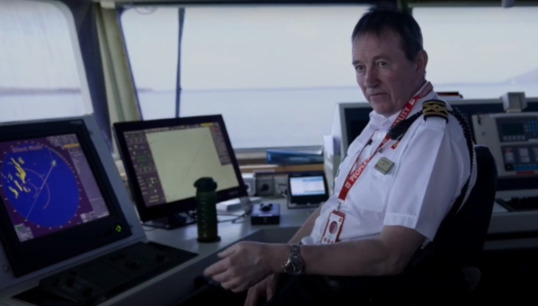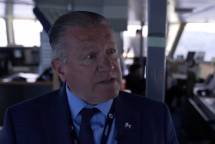- Topics
- Campaigning
- Careers
- Colleges
- Community
- Education and training
- Environment
- Equality
- Federation
- General secretary message
- Government
- Health and safety
- History
- Industrial
- International
- Law
- Members at work
- Nautilus news
- Nautilus partnerships
- Netherlands
- Open days
- Opinion
- Organising
- Podcasts from Nautilus
- Sponsored content
- Switzerland
- Technology
- Ukraine
- United Kingdom
- Welfare
Leading with experience: the CalMac master keeping island communities connected
26 June 2025

Helen Kelly recently caught up with Council vice chair Captain Iain MacKenzie, master of the CalMac ferry Loch Nevis. He explains how leading a lifeline service means not only connecting remote island communities, but also supporting the crew, sharing knowledge, and ensuring seafarers have a strong voice through their union.
As master of the Loch Nevis, Captain Iain MacKenzie is key to the lifeline service connecting the Hebridean islands of Canna, Eigg, Muck and Rum to the Scottish mainland. Having served as the vessel's master for four years, Captain MacKenzie is responsible for maintaining this vital link to remote communities, delivering not only essential supplies but also the tourists who now largely sustain the islands' economies.
The Loch Nevis plays an especially important role in providing year-round access for islanders, particularly during harsh weather or winter months, when ferry services become even more critical.
'The islands rely on us for everything, food, supplies, even getting students to and from the mainland. You can't just drive to these places. We're their link to the outside world.'
Capt MacKenzie's journey to the Loch Nevis began onshore, with a short-term contract managing vehicles in a ferry terminal car park, guiding cars and lorries onto vessels. Before long, he was working onboard CalMac's smaller ships, taking on a variety of roles as he rose steadily through the ranks.
'I started at the bottom and worked my way up, through deck duties, engine work, then onto the bridge again,' he says.
The construction of the Skye Bridge prompted a temporary shift in career, leading to a short spell as a lorry driver. But the pull of the sea proved stronger, and Capt MacKenzie soon returned to CalMac, where he has now served for over 30 years.
Father figure
Like any working vessel, the Loch Nevis presents its share of challenges. Reflecting on the demands of the role, he notes that a tightly packed schedule and a relatively small crew make teamwork, communication and clear leadership essential.
'You become more than just a captain,' he says. 'You’re a father figure, a confidant, a support, for everyone onboard. You have to listen, engage, lead.'
He also emphasises how leading the Loch Nevis is about more than just navigating the ship. With a small crew onboard, finding time to train and mentor less experienced colleagues can be a challenge, but it's also an essential responsibility that comes with the job.
'At the end of the day, knowledge isn't power. Knowledge is only of any value when it's shared,' he says. 'You have to make as much effort as you can to pass on the information to the junior ranks. If you don't share what you've learned and what you've been taught, it dies.'
As tourism to the islands has grown, the ferry service has evolved alongside it. It remains, of course, a lifeline service – as Capt MacKenzie says, 'We deliver this service year round. The people on the islands, on the whole, are really nice, and I would like to think thankful for the effort we make to get them from where they are to where they want to be.' Now, in addition to transporting food, parcels and livestock feed, the Loch Nevis now regularly carries visitors drawn to the natural beauty of the Small Isles for hiking and to enjoy the nature and wildlife. With increased frequency, especially during the summer months, the job brings long periods away from home, a reality for many maritime professionals.
'You might miss your your significant other's birthday. Sometimes you might miss anniversaries, birthdays, Christmases. Being away isn't as easy as it might seem or sound. The hardest thing is being away, knowing that there's something happening at home.'
Despite these sacrifices, Capt MacKenzie speaks positively about his long career at sea, and the steady progression he's made from his earliest days in a car park to captaining a lifeline vessel: 'I've always had a desire to do the best I can do, and I can only praise CalMac for giving me the opportunities and the training to be able to get me to where I sit now with as master of this vessel.'
'The abiding memory will be the islands and the people we’ve served. All you have to do is look around to see how beautiful the places are. I'm lucky to have that and to carry on with it.'
Connecting with other members
Alongside his professional duties, Capt MacKenzie has also served as a member of the Nautilus Council almost continuously since 2007. Having joined the Union in the mid-2000s, he’s witnessed and contributed to major changes across the company and the wider maritime sector. His work with colleagues such as Nautilus head of industrial Micky Smyth has helped ensure that members' voices are heard at every level.
But his Union involvement goes beyond high-level representation. Nautilus has provided him with personal support throughout his career.
'What have I gained from it? Lots of support when I've had any questions. Nautilus gives you access to people with knowledge and experience, there's the guidance you can get from the Legal Department, from the Industrial Department, and you can always feed into the Comms team and be able to share what you know with others.'

Backing CalMac seafarers
Micky Smyth, Nautilus International's head of industrial, joined Captain Iain MacKenzie aboard the Loch Nevis to meet members and reaffirm the Union's long-standing commitment to CalMac seafarers. Having spent over three decades at sea himself, Mr Smyth brings a wealth of experience and expertise to his industrial role. He knows firsthand what it means to work onboard and understands the pressures seafarers face. 'It helps to be onboard the ships to understand the issues,' he says. 'Sometimes you cannot represent members properly from the shore alone.'
Nautilus currently represents a wide range of CalMac professionals, including deck officers, engineers, masters and onboard services managers and shoreside employees. A dedicated six-member officers' committee provides comprehensive coverage across all departments covered by our single CBA.
For many years, Nautilus and CalMac have maintained a positive industrial relationship, and by working in a spirit of 'partnership and cooperation' has secured a series of improvements in pay and conditions for members.
Recent wins for members include:
- a major improvement in sickness benefits, with the qualifying period for full and half pay reduced from 10 years to 5 years' service
- successful efforts to protect the role of onboard services managers within the company restructure, ensuring continued union representation and proper consultation
- ongoing work to address the operational challenges of ageing tonnage and vessel reliability, issues that impact seafarers and passengers alike
Mr Smyth also highlighted the strong support structures available to members working at CalMac: a 24/7 contact network (Nautilus 24/7), we are one team with direct access to the industrial, professional and technical, comms and legal teams, and dedicated case handling by Nautilus strategic organiser Grant Mudie.
'Sometimes we have to tell members what they don't want to hear and sometimes, we have to tell the management what they don't want to hear, on behalf of members!', Mr Smyth says. 'But that's what being a good union means, you tell the truth, and you represent people with integrity and being clear and transparent.'
Tags
More articles
Nautilus Council member honoured for service to island communities
Captain Iain MacKenzie, a CalMac ferry master and vice-chair of Nautilus International Council, is to receive the UK Merchant Navy Medal for his 30 years of keeping Scottish islanders connected to medical services, loved ones and vital supplies.
